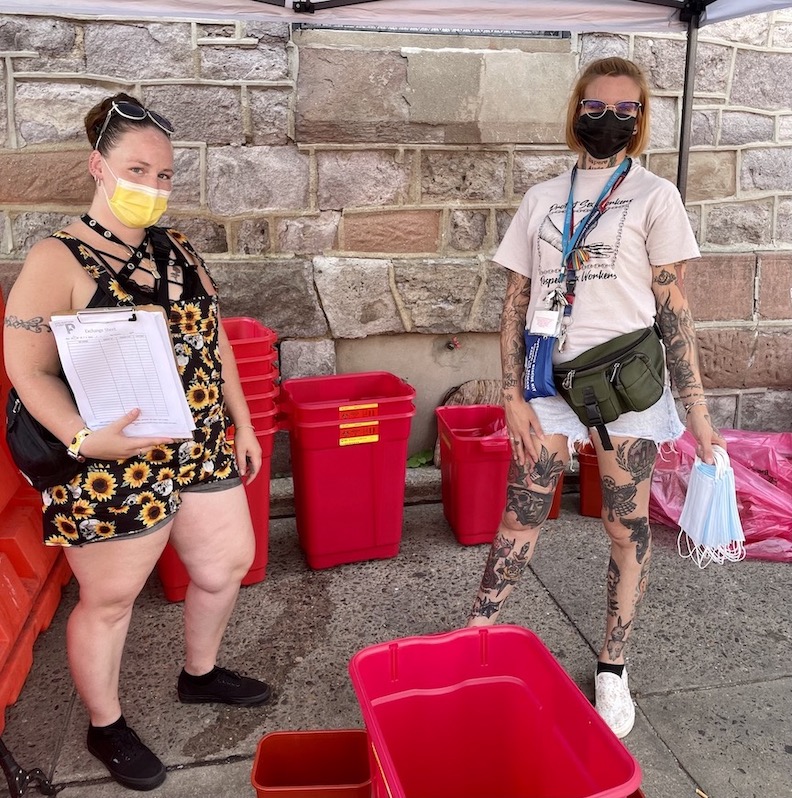
Nikki Volpicelli
@nikkivolp
I lost my best friend to an accidental overdose in 2019. When I began volunteering at Prevention Point, it was for him. Now I’m coming up on a year of working at the Step Up To The Plate meal site, and with the Overdose Prevention and HIV Prevention teams, and what I’ve realized is that while his memory is what got me into service, it’s not why I stayed.
Service is a lot like recovery. You enter with ideas about what you’ll get out of it, but what you receive isn’t even comparable. I began my recovery journey wanting to stop drinking and drugging. Now, three years later, I care about other people. I look people in the eyes. I use my experience to connect to others. And I get to put these traits to use when I volunteer.
Recovery is, by definition, the act of regaining something that is lost. But I don’t see it that way. So many of the things I have now, I never dreamed I’d have. Recovery is gaining without the re-. And that gaining comes through experience, empathy, acceptance, and community.
“When I was using drugs, no one was ever really happy to see me or excited that I was around. I was always the elephant in the room,” says Nicole Sage, HIV Prevention Program Co-Coordinator. “It is my hope that when I’m working with participants, they never feel this way.”
Nicole says she’s happy to be a person in recovery who loves and appreciates HIV prevention because the abstinence model of recovery—as popular and effective as it is for many—isn’t the only way, and that all-or-nothing approach can feel unwelcoming.

Jesse Zayas, Drop-In Case Manager and Safe Space Coordinator, says that through the first years of her recovery, she had a “very narrow perception” of what recovery could be. Then she began working with Prevention Point.
“[It’s] not a one-way street, it's multiple avenues,” she says. “I realize my way of recovery does not work for everyone, and that is completely okay. I do not judge someone's way of life. It was a long journey to get where I am today, but I am grateful for the experience because I can share it with participants,” she says.
“Prevention Point has opened my eyes to what HIV prevention is. It's loving and caring for someone because they deserve love and care; and respect, too.”
The truth is, no one comes from exactly the same place, so no one can say what works for them will work for someone else. Which is a big part of the philosophy of HIV prevention. It’s something I’ve learned while working with Prevention Point; something Nicole learned, first as a participant and later as a coordinator; and something Jesse also credits Prevention Point for showing her.

“Prevention Point has opened my eyes to what HIV prevention is. It's loving and caring for someone because they deserve love and care; and respect, too,” she says.
Whether it’s a 12-step program, “Grant me the serenity to accept the things….” or meeting people where they’re at, at the heart of recovery and HIV prevention is acceptance.
Acceptance is something I still struggle with and probably always will. But working alongside so many people with such different life experiences helps. It gets me out of my own head, alleviates some grief.
Every day, I meet participants who remind me of my friend—someone with a cynical sense of humor, a love for dogs. Someone wearing a NASA backpack or a shirt with a dinosaur on it. In those moments he feels close.
Every day, I meet participants who remind me of myself. And I get to share that with them.
Nikki Volpicelli is a volunteer at Prevention Point Philadelphia. She teaches writing composition at Temple University and is working towards her MFA in fiction writing at Bennington College.